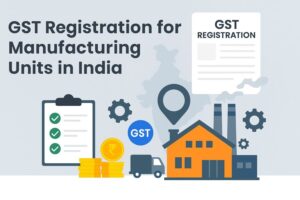Services Provided to Government Under GST: Tax & Exemptions
- 24 Sep 25
- 13 mins
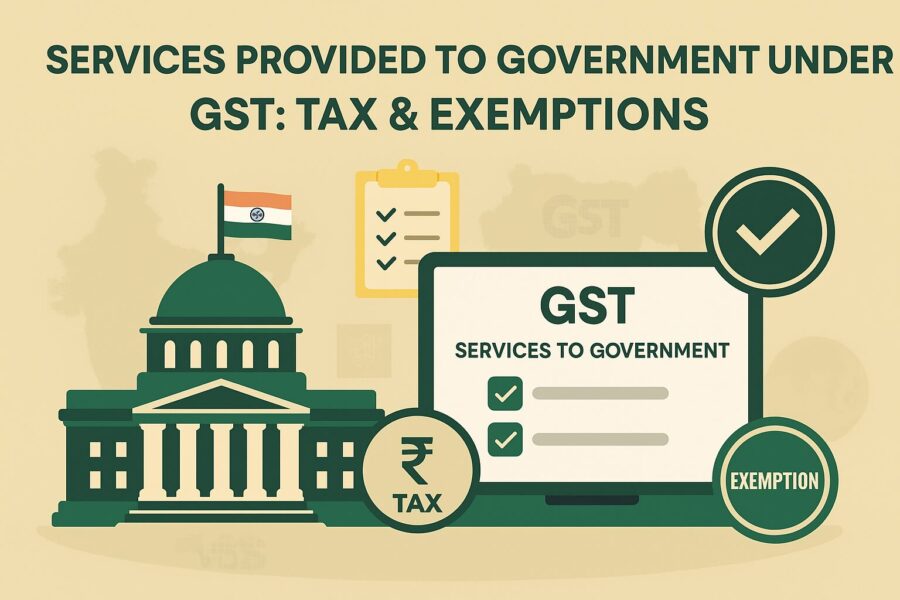
Services Provided to Government Under GST: Tax & Exemptions
- Definitions Under GST Law
- Categorisation of Government Services Under GST
- Exempted Services Supplied by the Government/Local Authority
- Services Taxable Under Reverse Charge Mechanism (RCM)
- Services Taxable Under Forward Charge Mechanism (FCM)
- Compliance Tips for GST on Services Supplied by Government
- Conclusion
Key Takeaways
- Services provided to the government under GST are taxable unless specifically exempt by law or notification.
- Sovereign functions of Panchayats and Municipalities under Articles 243G & 243W are exempt services under GST.
- Certain supplies to government bodies fall under Reverse Charge Mechanism (RCM) in GST, making the recipient liable to pay tax.
- Non-sovereign activities like renting of immovable property by government are taxable under Forward Charge or RCM.
- Businesses must track GST notifications, ITC rules, and exemptions to ensure GST compliance for government services.
The Goods and Services Tax (GST) framework in India carefully strikes a balance between taxability and exemptions from tax on goods and services. Likewise, many services provided to the government under Goods & Services Tax are exempt. Administrative and constitutional duties may be exempt, but many other services, such as commercial licensing and real estate rentals, are heavily taxed.
For instance, it is recommended in the 54th GST Council Meeting to exempt research and development services supplied by a Government entity or other institution when funded through government or private grants.
This article provides a comprehensive analysis of the implications of GST taxation for services provided by the government.
Definitions Under GST Law
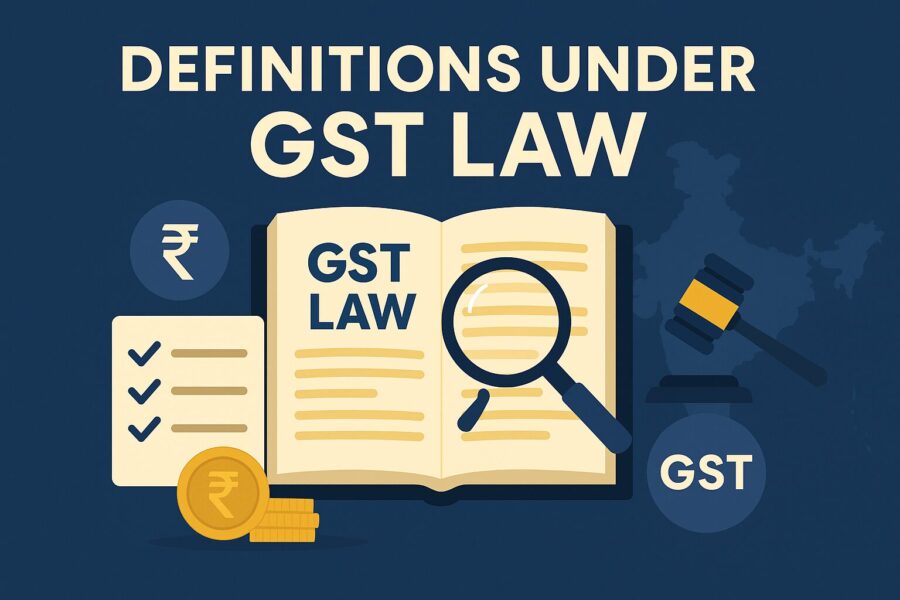
To effectively figure out if GST applies to services provided to the government under GST, the definition of the following terms needs to be explained:
Meaning of "Government" Under GST
The Central Goods and Services Tax (CGST) Act, 2017, defines "Government" in Section 2(53) as the Central Government. The same principle applies to the State Goods and Services Tax (SGST) Act, which refers to the State Government.
This legal difference is crucial because whether GST registrations and GST exemptions are applicable or not often depends on whether the State or Central Government is providing the service.
Meaning of "Local Authority" Under CGST
Section 2(69) of the CGST Act defines a "Local Authority" as any group that is legally responsible for managing municipal or local funds. This includes a Panchayat, Municipality, District Board, Zilla Parishad, Cantonment Board and other groups. It also has Development Boards, Regional Councils and District Councils.
The Constitution of India recognises these authorities and gives them civic and administrative duties. Therefore, knowing these definitions helps you figure out what kind of service provider you are and what the GST effects will be.
Categorisation of Government Services Under GST
The Government is regarded as a "person" under the Goods and Services Tax (GST) regime, as mentioned in the CGST Act. According to this classification, any type of supply of goods or services made by or to the government is taxable unless otherwise specified.
However, the law makes a significant distinction between commercial or non-sovereign activities and sovereign functions carried out by a public authority. This distinction determines the taxability of services provided to the government under GST.
- Services Not Regarded as Supply (Exempt as Sovereign Functions)
Under GST, certain actions taken by central or local governmental authorities acting in their official capacities are not regarded as supplies of goods or services. This includes the duties assigned by the Indian Constitution to municipalities and panchayats.
Any service regarding Article 243G or Article 243W is exempt from GST, per Notification Nos. 14/2017-CT (Rate) and 11/2017-IT (Rate).
| Article | Schedule | Entrusted To | Nature of Functions |
| 243G | Eleventh Schedule | Panchayats | Economic development and social justice (e.g., agriculture, minor irrigation, education, rural housing) |
| 243W | Twelfth Schedule | Municipalities | Urban planning and civic amenities (e.g., roads, water supply, water treatment, sewerage treatment, sanitation, fire services) |
B. Government Companies Are Not “Government”
GST does not regard government corporations or companies as government departments, even if the government fully owns them. These organisations receive the same treatment if services provided to the government under GST are made as any other taxable person. Unless otherwise noted, their services are not exempt.
C. Detailed List of Functions – Exempt Sovereign Activities
One must determine whether a governmental authority service is exempt from GST by determining whether it pertains to duties specified in the Constitution's Eleventh or Twelfth Schedules, crossing the threshold limit, includes Nil Rated supplies, exempt supplies, and crosses the aggregate turnover.
The following table shows the services included in the Twelfth Schedule: Functions of Municipalities (Article 243W):
| Sl. No. | Function |
| 1 | Urban planning, including town planning |
| 2 | Regulation of land use and construction of buildings |
| 3 | Planning for social and economic development |
| 4 | Civil structures like roads and bridges |
| 5 | Water supply for domestic, industrial and commercial purposes |
| 6 | Public health, sanitation, conservancy and solid waste management |
| 7 | Fire services |
| 8 | Urban forestry, protection of the environment and promotion of ecological aspects |
| 9 | Safeguarding the interests of weaker sections of society, including the handicapped and mentally retarded |
| 10 | Slum improvement and upgradation |
| 11 | Urban poverty alleviation |
| 12 | Provision of urban amenities and facilities such as parks, gardens, and playgrounds |
| 13 | Promotion of cultural, educational and aesthetic aspects |
| 14 | Burials and burial grounds; cremations, cremation grounds; and electric crematoriums |
| 15 | Cattle pounds: prevention of cruelty to animals |
| 16 | Vital statistics, including registration of births and deaths |
| 17 | Public amenities include street lighting, parking lots, construction services, bus stops and public transport like metered cabs, auto rickshaws |
| 18 | Regulation of slaughterhouses and tanneries |
The following table shows the services included in the Eleventh Schedule: Functions of Panchayats (Article 243G):
| Sl. No. | Function |
| 1 | Agriculture, including agricultural products |
| 2 | Land improvement, implementation of land reforms, land consolidation and soil conservation |
| 3 | Minor irrigation, water management and watershed development |
| 4 | Animal husbandry, fresh fruits, dairying and poultry and basic food items |
| 5 | Fisheries |
| 6 | Social forestry and farm forestry |
| 7 | Minor forest produce |
| 8 | Small-scale industries, including food processing industries |
| 9 | Khadi, village and cottage industries |
| 10 | Rural housing |
| 11 | Drinking water |
| 12 | Fuel and fodder |
| 13 | Roads, culverts, bridges, ferries, waterways and other means of communication |
| 14 | Rural electrification, including the distribution of electricity |
| 15 | Non-conventional energy sources |
| 16 | Poverty alleviation programme |
| 17 | Education, including primary and secondary schools |
| 18 | Technical training and vocational education |
| 19 | Adult and non-formal education |
| 20 | Libraries |
| 21 | Cultural activities |
| 22 | Markets and fairs |
| 23 | Health and sanitation, including hospitals, primary health centres and dispensaries |
| 24 | Family welfare |
| 25 | Women and child development |
| 26 | Social welfare, including the welfare of the handicapped and mentally retarded |
| 27 | Welfare of the weaker sections, and in particular, of the Scheduled Castes and the Scheduled Tribes |
| 28 | Public distribution system |
| 29 | Maintenance of community assets |
Exempted Services Supplied by the Government/Local Authority
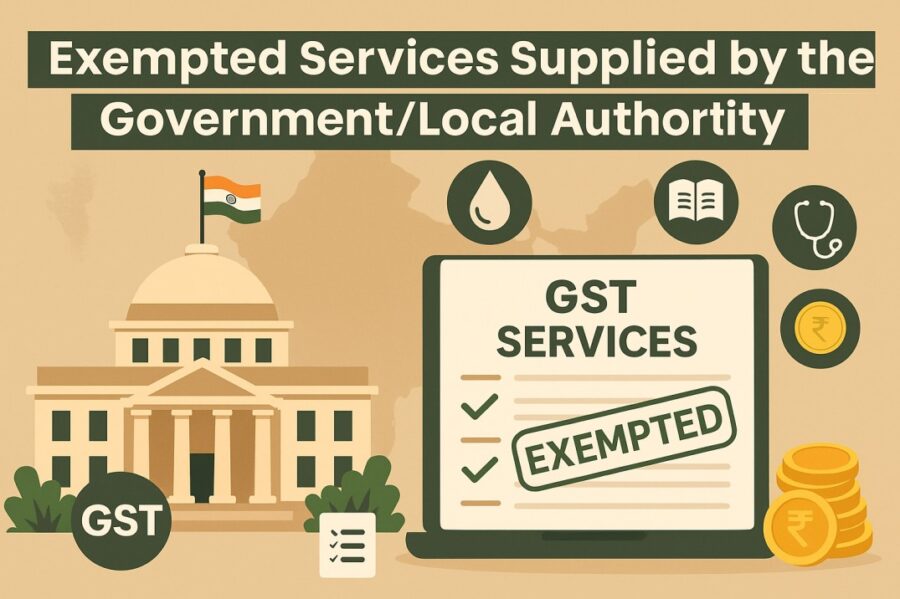
Since the Government is considered a person under the GST provision, all goods and services provided to the government under GST are either taxable or exempt. Three categories of supplies by the government/local authority are exempt from GST:
- Those that are taxed as zero-rated supplies,
- Those who are fully or partially exempt from government notifications
- Non-taxable supplies that are specifically outside the purview of GST, such as alcoholic liquor for human consumption, petroleum products, fossil fuels and aviation turbine fuel.
Through notifications suggested by the GST Council, the Central or State Government grants GST exemptions that serve public authority interests. The government could be exempt from either:
- Suppliers: Regardless of the time of supply, some individuals (such as nonprofit organisations) are exempt.
- Certain supplies: Regardless of the provider, certain services (such as supporting athletic events or providing public amenities) are exempt.
Importantly, interstate transactions require separate exemption notifications because the aspect of GST exemption does not automatically transfer from the CGST Act to the IGST Act. Since ITC cannot be claimed on exempt supplies, the ITC associated with such supplies must be reversed proportionately.
Additionally, the GST law distinguishes between nil-rated supplies, zero-rated supplies, exempt supplies, and non-GST supplies, each of which has distinct tax rate ramifications. For instance, fresh fruits are exempt from GST and are not eligible for ITC claims, but exports are zero-rated supplies.
| Types of Services | Examples |
| Agricultural Services | Activity in relation to harvesting, renting or leasing agricultural machinery, cultivation, services provided by commission agents for agricultural products, supplying farm labour and warehouse-related activities. |
| Government Services | Services offered by foreign diplomats in India, postal services, services by employees in government offices, transportation of people or goods, services offered to diplomats and services by the Reserve Bank of India. |
| Transportation Services | Transportation of passengers by air, payment of toll, transportation of goods by road, rail, water, and transportation of goods where the cost is less than ₹1,500. |
| Judicial Services | Activity in relation to partnership firms of advocates, arbitral tribunal services and senior advocates to individuals or businesses with aggregate annual turnover up to ₹40 lakh. |
| Educational Services | Examination services, transportation of faculty or students, mid-day meal scheme and services offered by Indian Institutes of Management (IIMs). |
| Medical Services | Services that consist of items ambulances, charitable medical services, medical professionals, and veterinary doctors; excludes cosmetic, plastic surgery or hair transplants. |
| Organisational Services | Activity in relation to tour operators for foreign tourists, and services by exhibition organisers for international business exhibitions. |
| Other Services | Admission fees to theatres, circuses and sports events charging fees up to ₹250, services offered by GSTN to the Central/State Government or Union Territories. |
Services Taxable Under Reverse Charge Mechanism (RCM)
Certain services provided to the government under GST are subject to tax, where liability is shifted to the recipient rather than the supplier under the Goods and Services Tax (GST) framework. The Reverse Charge Mechanism (RCM) is the name of this tax payment method.
According to Notification No. 13/2017 - Central Tax (Rate) dated June 28, 2017, the recipient of certain services provided by the federal, state, or local governments is required to pay GST under RCM.
In particular, services rendered to business entities by the governmental authority are liable to GST under reverse charge, which means that the business entity that receives the service, rather than the government or local authority that provided it, is responsible for raising the tax invoice. This rule is applicable in exceptional circumstances.
The recipient is not liable for reverse charges for services like renting real estate, providing postal services (such as speed post, express parcel post, agency services, and life insurance) to people other than government agencies, transporting passengers or goods, or providing services about aircraft or vessels within port or airport precincts.
Even in cases where the service provider (the government or local authority) may not be required to collect GST, this mechanism guarantees that tax is collected effectively. Under RCM, the recipient is in charge of determining and paying the GST to the governmental authority directly. In services provided to the government under GST, this clause improves revenue collection and compliance costs/burden.
The following table summarises these provisions:
| Category of Service | Person Liable to Pay GST |
| All services provided by the Central/State Governmental authority or local authority to business entities, except: | Business entities located in the taxable territory |
| - Renting of immovable property | |
| - Postal department services (speed post, express parcel post, agency services, life insurance) | |
| - Transport of goods or passengers | |
| - Services relating to aircraft or vessels within port/airport precincts | |
| Renting of immovable property services provided by the Government/local authority to a registered person | Registered person |
Services Taxable Under Forward Charge Mechanism (FCM)
The Forward Charge Mechanism (FCM) imposes taxes on government and local government services that do not fall under the categories of exempt or reverse charge services. As the service provider in this case, the government or local governmental authority is in charge of collecting and remitting the Goods and Services Tax (GST) to the government.
This indicates that the supplier, not the recipient, is liable for taxes. These services are not covered by exemptions or reverse charge notifications, so the government agency is responsible for adhering to standard GST regulations and paying taxes using the forward charge system.
Compliance Tips for GST on Services Supplied by Government
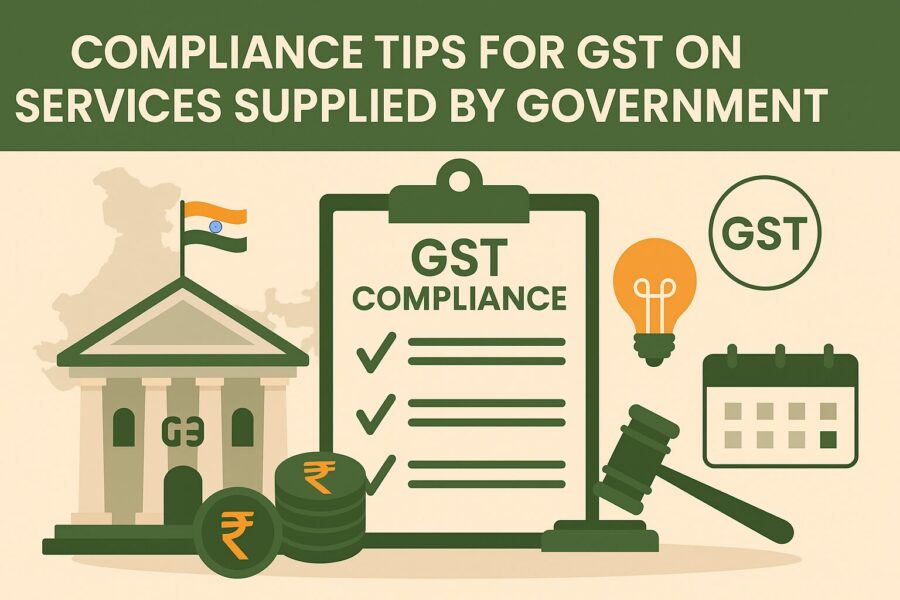
Due to different tax treatments, it can be difficult to comply with GST regulations regarding services provided by governmental authorities or services provided to the government under GST. To guarantee accuracy and prevent fines, follow these crucial compliance guidelines:
- Determine the Tax Mechanism
To start, ascertain whether the service is taxable under the Forward Charge Mechanism (FCM), Reverse Charge Mechanism (RCM) or exempt.
- Regularly Review Notifications
Notifications like Notification No. 13/2017 (RCM applicability) and No. 12/2017 (exempt services) are important. The GST Council may release updates that alter the rate of tax applicability.
- Input Tax Credit (ITC)
Only after paying the tax can you claim the ITC for services rendered under RCM. No ITC is permitted for exempt services, and the proper reversal is required.
- Preserve Accurate Documentation
Preserve accurate documentation by preserving service contracts, receipts for tax payments and classification notes. Furthermore, clear records can make audits and compliance easier.
Conclusion
Understanding the GST provisions, making sure compliance is correct, and planning your finances properly will guide you in learning about taxability and exemption of services provided to the government under GST.
No matter the classification, companies should pay attention to notifications and keep all their records up to date. Payments should be made easily and on time, use all eligible ITC and talk to tax experts regularly to avoid fines and maintain a smooth operation. Therefore, following the GST provisions helps companies avoid serious financial and legal threats in the future.
💡If you want to streamline your payment and make GST payments via credit, debit card or UPI, consider using the PICE App. Explore the PICE App today and take your business to new heights.















